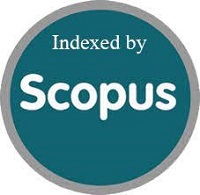Aplikasi Model Rasch Untuk Validasi Instrumen Pengukuran Fundamentalisme Agama Bagi Responden Muslim
DOI:
https://doi.org/10.15408/jp3i.v5i1.9239Keywords:
Fundamentalisme, Model RaschAbstract
Abstract
This research aims to validate religious fundamentalism instrument developed for Muslim respondents by using Rasch Model. Altemeyer and Hunsberger (1992) said that fundamentalism refers to the attitude toward religious beliefs. The sub dimentions of fundamentalism based on: (a) The attitude toward belief that religion including all matters and never be wrong; (b) The attitude toward belief in opposing forces and must be resisted; and (c) The attitude toward belief that religious truth is absolute and does not need to be contextualized. The data was collected from 113 Muslim students in Yogyakarta. Result of analyzis shows a good instrument’s reliability index (α = 0,85), respondent’s reliability (α=0,82), and item’s reliability (α=0,97). Generally, this instrument can explain 41,8% variances in the respondents. Based on these findings, the religious fundamentalism among Muslim can be assessed by this instrument.
Abstrak
Penelitian ini bertujuan untuk memvalidasi instrumen fundamentalisme agama yang dikembangkan untuk respoden Muslim dengan memakai model Rasch. Fundamentalisme mengarah pada sikap terhadap keyakinan agama. Sub dimensi dari fundamentalisme didasari oleh: (a) sikap terhadap keyakinan bahwa agama mencakup semua hal dan tidak pernah keliru; (b) sikap terhadap keyakinan bahwa terdapat hal yang berlawanan dan harus ditolak; and (c) sikap terhadap keyakinan bahwa kebenaran agama bersifat absolut dan tidak perlu untuk dijadikan kontekstual. Data diperoleh dari 113 siswa Muslim di Yogyakarta. Hasil dari analisis menunjukkan indeks reliabilitas instrumen (α = 0,85), reliabilitas responden (α=0,82), dan realibitas item (α=0,97). Secara umum, instrumen ini bisa menjelaskan 41,8% varians dalam responden. Berdasarkan temuan ini, fundamentalisme agama di antara Muslim dapat dinilai dengan menggunakan instrumen ini.
DOI : 10.15408/jp3i.v5i1.9239
References
DAFTAR PUSTAKA
Adamovova, L. (2005). Implicit theory of religious fundamentalism among Slovak young adults. Studia Psychologica, 47, 3.
Altemeyer, B. (2003). Why do religious fundamentalists tend to be prejudiced? The International Journal for The Psychology of Religion. 13 (1), page: 17-28.
Altemeyer, B & Hunsberger, B. (1992). Authoritarianism, religious fundamentalism, quest and prejudice. International Journal for The Psychology of Religion, 2:2, page: 113-133.
_________________________________. A revised religious fundamentalism scale: The short and sweet of it. The International Journal for The Psychology of Religion, 14 (1), page: 47-54.
Bloom, P.B.N & ARikan, G. (2012). A two edge sword: The differential effect of religious belief and religious social contexton attitudes towards democracy. Political Behavior, vol. 34, page: 249-276.
Bond, T.G., & Fox, C. (2007). Applying the rasch model. Fundamental measurement in the human sciences. Lawrence Erlbaum Associates, Publishers. Mahwah. New Jersey
Bruce, S. (1990). Modernity and fundamentalism: The new christian right in America. The British Journal of Sociology, Vol. 41, No. 4. Page: 477-496.
Chong, H.Y. (2013). A simple guide to the item response theory (IRT) and rasch modelling. Published in http://www.creative-wisdom.com
Dover, H; Miner, M & Dowson, M. (2007). The nature and structure of muslim religious reflection. Journal of Muslim Mental Health, 2: 189-210.
Friedman, M & Rholes, W.S. (2007). Successfully chalenging fundamentalist beliefs results in increased death awareness. Journal of Experimental Social Psychology, 43, page: 794-801.
Gursuch, R.L. (1993). Religion and prejudice: Lessons not learned from the past. The International Journal for The Psychology of Religion, 3 (1), page: 29-31.
Hood, R.W; Hill, P.C; Williamson, W.P. (2005). The psychology of religious fundamentalism. New York: The Guilford Press.
Liht, J; Conway, G; Savage, S; White, W, O’Neill, K.A. (2011). Religious fundamentalism: An empirical derived construct and measurement scale. Archive for the Psychology of Religion 33 (2011) 1-25.
Linacre, J.M. (2006). A user’s guide to winstep ministep rasch-model computer programme, available at www.winstep.com.
Misbah, I.H & Sumintono, B. (2014). Pengembangan dan validasi instrumen “persepsi siswa terhadap karakter moral guru” di Indonesia dengan model rasch, dipresentasikan dalam Seminar Nasional “Pengembangan Instrumen Penilaian Karakter yang Valid” di Fakultas Psikologi, Universitas Muhammadiyah Surakarta.
Mora, L.E & McDermut, W. (2011). Religious fundamentalism and how it relates to personality, irrational thinking, and defence mechanism. Journal of Religion and Society, Vol. 13 (2011).
Munson, H. (2003). Fundamentalism. Religion, 33 (2003), page: 381-385.
Putra. I.E & Wongkaren. Z.A. (2009). Skala fundamentalisme Islam dan pengaruhnya terhadap prasangka. Psikobuana.
Rajashekar. J.P. (1989). Islamic fundamentalism: Reviewing a stereotype. The Enumeical Review, Volume 41, Issue 1, page : 64-72.
Schaafsma, J & Williams, K.D. (2012). Exclusion, intergroup hostility, and religious fundamentalism. Journal of Experimental Social Psychology, 48, page: 829-837.
Sumintono, B & Widhiarso, W. (2013). Aplikasi model rasch untuk penelitian ilmu-ilmu sosial. Jakarta: Tim Komunikata Publishing House.
Wibisono, S. (2014). Menakar label fundamentalisme untuk muslim. Psikologika, Vol. 19, No.1 tahun 2014.
Wrench, J.S, Corrigan, M.W, McCeoskey, J.C & Carter, N.M.P. (2006). Religious fundamentalism and intercultural communication: The relationship among ethnocentrism, intercultural communication apprehension, religious fundamentalism, homonegativity, and tolerance for religious disagreement. Journal of Intercultural Communication Research, Vol. 35, No 1, page: 23-4



